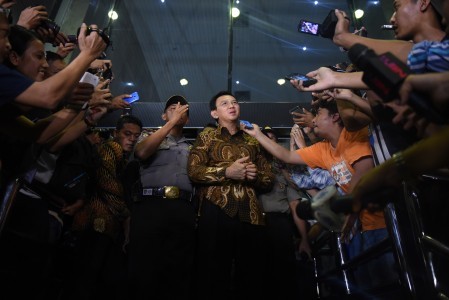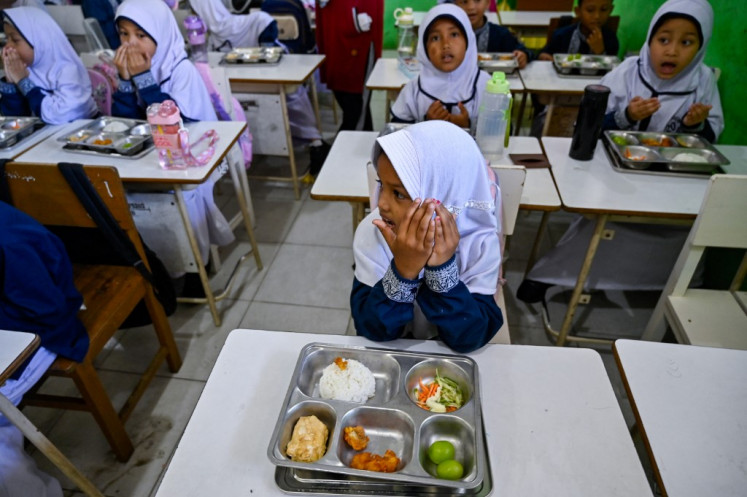Popular Reads
Top Results
Can't find what you're looking for?
View all search resultsPopular Reads
Top Results
Can't find what you're looking for?
View all search resultsPress freedom: Between ethics and extortion
Unscrupulous people claiming to be journalists have asked for 10 to 15 percent of the Rp 1 billion village fund the central government grants each village annually for local development.
Change text size
Gift Premium Articles
to Anyone
 Jakarta Governor Basuki "Ahok" Tjahaja Purnama answers questions from journalists at the Corruption Eradication Commission (KPK) Headquarters on Tuesday. KPK investigators grilled Ahok for 12 hours as a witness in the alleged state loss of land procurement of Sumber Waras Hospital as reported by the Supreme Audit Agency. (Antara/Hafidz Mubarak A.)
Jakarta Governor Basuki "Ahok" Tjahaja Purnama answers questions from journalists at the Corruption Eradication Commission (KPK) Headquarters on Tuesday. KPK investigators grilled Ahok for 12 hours as a witness in the alleged state loss of land procurement of Sumber Waras Hospital as reported by the Supreme Audit Agency. (Antara/Hafidz Mubarak A.)
“The Press Council forbids us from giving money to journalists.” The unambiguous statement in Indonesian is on a poster in yellow letters on a blue field. Beneath the words is the drawing of a black hand trying to grab loose Rp 1,000 ( 76 US cents ) to Rp 100,000 bank notes.
A red ring with a diagonal red line crossing it is placed over the hand in analogy with a prohibited-to-act sign. The name, the Jakarta address, phone and fax numbers, the website and email address of the state-funded independent council, which handles public complaints in regard to the press, is printed on the bottom left corner of the poster.
This poster and others quoting the council-mandated Journalism Code of Ethics ( JCE ) are plastered on the walls of the office of the regent of Karimun in the Riau Islands province.
In the regency capital of Tanjung Balai Karimun, the regent complained to Yosep Adi Prasetyo, the visiting chief of the council in February.
Unscrupulous people claiming to be journalists have asked for 10 to 15 percent of the Rp 1 billion village fund the central government grants each village annually for local development.
The pseudo-journalists have as many as 500 websites for a district population of only 270,000 people.
Two weeks later, council team returned with the posters and briefed the district chief on their use. One poster quotes Article 6 of the JCE: “The Indonesian journalist does not misuse his/her profession and accepts no bribes.”
The article explains, “Bribes are all gratuities in the form of money, articles or facilities from others that affect the journalist’s independence.” The posters had a deterrent effect. “They [the extortionists] stopped coming. Before the posters were put up, even the public relations staff was afraid to go to work,” Stanley, as Yosep is better known, related later.
Stanley became the new chair of the council on March 23 for a three-year term succeeding Bagir Manan, the respected law professor at Padjadjaran University in Bandung.
Stanley related his Tanjung Balai Karimun account at a hail and farewell dinner of the new and old nine-member council at the Sari Pan Pacific hotel on April 7.
Where extortion occurs, corruption thrives. In 2015 the council received 788 complaints. Some 80 percent were related to ethics, Stanley said.
Extortion is a serious complaint. Village heads and public schools in rural areas that receive state funding are easy prey.
Legitimate journalists are familiarized with the JCE that was drafted by 29 journalist associations and press corporation organizations.
The council validated the resulting code on March 24, 2006. Real journalists are tested for their competence in journalism skills, knowledge and ethics.
Competency tests are regularly conducted by journalism institutions such as the Indonesian Journalists Association ( PWI ) and the Alliance of Independent Journalists ( AJI ), which the council recognizes. Those who pass the test have their names posted on the council website so the public can check their legitimacy.
Public and private organizations can check the council website for the status of a journalist ostensibly making a call for an interview. If his or her name is registered but asks for money or other gratuities, the individual should be reported to the council and his or her name would be removed.
The problem is that extortion practitioners in the guise of journalists still operate beyond council scrutiny. Offices should request posters that have a proven deterrent effect.
The council is the watchdog on compliance to the 11-article JCE. It will have to monitor any violation on all code provisions, including Article 1: “The Indonesian journalist is independent and produces news stories that are accurate, balanced and without malice.”
In interpretation, “independent means reporting events or facts in line with one’s conscience without interference, coercion and intervention from other parties, including the owners of the press corporation.”
Compliance to Article 1 ties in with the nation’s gubernatorial elections in 2017. A hot race is the governorship of Jakarta, where incumbent Basuki “Ahok” Tjahaja Purnama is to stand as an independent. However, Ahok’s rivals may have party affiliation.
These contenders may get favorable coverage from media outlets whose owners are political party patrons and harbor a political agenda. These media outfits include the MNC group, owned by Hary Tanoesoedibjo, Metro TV owned Surya Paloh, and TV One operated by the Bakrie family.
Stanley and his associates may have to remind media owners to comply with Article 1 and safeguard the sanctity of independent reporting. May 3 is World Press Freedom Day, primarily observed in Helsinki this year. It would be an appropriate time to review the issues the Indonesian press faces.
One unending sore issue is impunity and eight unresolved cases of murder of journalists, notably the 1996 killing of Bernas daily corruption-busting reporter Fuad “Udin” Muhammad Syarifuddin in Yogyakarta.
As for the council, resolving the issues become more demanding as Indonesia hosts World Press Freedom Day in Jakarta on May 3, 2017.
***
The writer, a senior journalist, teaches at Dr. Soetomo Press Institute ( LPDS ), Jakarta.
---------------
We are looking for information, opinions, and in-depth analysis from experts or scholars in a variety of fields. We choose articles based on facts or opinions about general news, as well as quality analysis and commentary about Indonesia or international events. Send your piece to community@jakpost.com.









